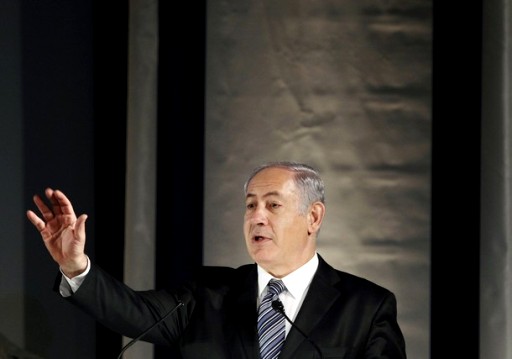10/29/2010
Netanyahu: Direct talks are only path to true Mideast peace
October 29, 2010 (KATAKAMI / HAARETZ) --- PM's comment comes after Abbas says considering appeal to UN Security Council to approve unilateral declaration of Palestinian statehood.
Direct peace talks are the only path to achieve genuine Middle East peace, Prime Minister Benjamin Netanyahu said in a statement on Thursday, hours after Palestinian President Mahmoud Abbas said the Palestinians were considering a unilateral declaration of statehood.
Netanyahu has refused to extend a 10-month moratorium on new West Bank settlement housing starts that expired on September 26, with Abbas saying he won’t resume the talks without an extension on the building curbs.
Earlier Thursday, in a joint press conference with Egyptian Foreign Minister Ahmed Aboul Gheit, the Palestinian Authority president hinted that the Palestinians would try to persuade the United States to recognize a Palestinian state in the West Bank, Gaza and East Jerusalem, if Israel kept up its refusal to freeze settlements.
“For now, we are focusing on the first option [negotiations],” Abbas said.
In a statement released later Thursday, Netanyahu said Israel expected the "Palestinians to live up to their obligations by holding serious direct negotiations, without malice and without preconditions."
"Any attempt to bypass direct talks by appealing to international bodies will do nothing to advance the true peace process," the PM's statements said, adding that the two peoples could achieve "a secure and stable peace solely through direct negotiations, a path I hope we shall return to in full force soon."
UN diplomats, responding to Abbas' threat of a unilateral declaration, said earlier this week that such a move would represent a severe strategic error on Abbas' side, calling Palestinian hopes of a possible U.S. abandonment of its traditional support of Israel UN Security Council a "wild dream."
"Even a hostile U.S. president won't free the UNSC floor to anti-Israel moves," a senior diplomat said, adding that the Americans would do "anything to thwart an initiative such as a unilateral declaration of Palestinian statehood."
The diplomat added that a UNSC approval of such a move would "be the equivalent of declaring war on Israel, and the United States would prevent that at any cost. U.S. support of Israel is part of its DNA."
Earlier Thursday, Aboul Gheit indicated that U.S. efforts to restart Mideast peace talks between Israel and the Palestinians have not produced results so far, saying that his government was continuing its contacts with the U.S. and Israel, but that “up to now, the necessary breakthrough did not take place.”
Egypt, the first Arab country to reach peace with Israel, wields considerable influence in the Arab world and serves as an important mediator between Israel and the Palestinians.
Aboul Gheit said Netanyahu’s national security adviser, Uzi Arad, recently held talks with Egyptian officials.
“During the meeting, Egypt confirmed its … support for the Palestinian demand,” Aboul Gheit told the news conference.
In response to Aboul Gheit's remarks regarding the apparent lack of peace talks progress White House spokesman Robert Gibbs said Thursday that the settlements "is a very difficult issue. It is - it's one that has been with us for decades, and we are trying to make some slow progress on it."
The White House official added that there were "are a series of very tough issues that have to be addressed between the two sides as we move forward, adding that the United States was continuing "to work."
"There are no guarantees in this process. We do know this: That the process works best and has its maximum of working if the United States is actively engaged in the process of bringing these two parties and these two sides together," Gibbs said, adding that the sides aren't going "to make progress if the United States is not involved."
"That's why the president has dedicated such time to trying to bring about a two-state solution to, again, a problem that has been very, very difficult," Gibbs said, adding that Washington "started this process, again, at the beginning of his administration, and even in the talks that were held here, with no illusions that this one was going to be the easy problem that we'd picked to solve."
